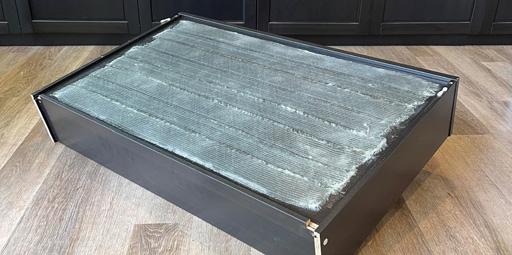
As a beginner to intermediate epoxy user, we focus a lot of effort on learning techniques for mixing and applying epoxy. While these skills are important, there are other aspects to epoxy success that most of us only learn through experience. Luckily, or unluckily, depending on how you want to look at it, I've learned a lot about what not to do from working on my own projects. Through my experiences, and hours hanging around our GBI Technical Advisors and their projects, I've learned a few approaches to help make things go smoother. Hopefully, some of the knowledge I've gained can help you on your next project.
Have a Well-Developed Plan
It's easy to think to yourself, "This will be easy. I'll just slap a little fiberglass on here, a little epoxy on there, and bam! Good to go." It's important to walk through each individual step. How much epoxy am I going to mix? Am I going to mix it in one batch, or in stages to prolong pot life? Are all my materials cut to size and dry fit? Should I wet out my fabric in place or on a flat table? Will it cause problems if the fiberglass stiffness changes once wet out? How am I going to clamp? Etc. Basically, you want to do a dry run of the whole repair before mixing a drop of epoxy.
A few years ago, I was reinforcing the bottom of the drawers in my Ikea wardrobe with some fiberglass, so they could support our heavy winter boots. The external temperature was around 80°F degrees, but the inside temperature of my garage where I was working felt much cooler. I grabbed my WEST SYSTEMⓇ 105 Epoxy Resin/206 Slow Hardener, and mixed my epoxy. I trimmed my fiberglass as I went, since it was such a simple shape. First drawer, no problem. Second drawer, no problem. Halfway through the third drawer (of seven) the batch kicked off in the pot before it even touched the fiberglass.
This story is from the Fall 2023 edition of Sailing World.
Start your 7-day Magzter GOLD free trial to access thousands of curated premium stories, and 9,000+ magazines and newspapers.
Already a subscriber ? Sign In
This story is from the Fall 2023 edition of Sailing World.
Start your 7-day Magzter GOLD free trial to access thousands of curated premium stories, and 9,000+ magazines and newspapers.
Already a subscriber? Sign In

Tips for More Successful Epoxy Projects
That have nothing to do with epoxy mixing or application techniques

Auxiliary Rear Station Build
From past fishing experiences, I've learned that quick changes in speed and direction are often required when retrieving a hooked fish.

TARGETED PERFORMERS
Defending their title at the 420 Youth Worlds in July, Freddie Parkin and Asher Beck were on a roll-until they weren't.

BALANCE ON THE PINNACLE
The path to gender equity in the Olympics has been a long and twisted one, but when the sailors assemble in Marseille next year, we'll finally see what's been a long time coming.

SIMPLE STEPS TO CONSISTENT SPEED
Boatspeed is the magic ingredient for winning races because we can get away with bad decisions if we are fast, but we can't make good choices if we're slow.

THREE-DIMENSIONAL JIB-LEAD ADJUSTMENTS
Floating jib leads give trimmers more dynamic control of the headsail profile.

BETTER TOGETHER
Success over three decades comes down to making it meaningful.

JUSTINE THE MACHINE
This self-effacing Swiss sailor has-in her quiet and understated way become one of the stars of offshore ocean racing in recent years, whether as part of a winning crew in The Ocean Race or building her credentials as a top-class solo racer.

THE MULTITASKING MULTIHULL MOM
Competing in Olympic sailing's most challenging discipline is one thing, but doing so with a tyke in tow takes the campaign hustle to a higher level.

CONNECTED COAST TO COAST
From sunny St. Pete to historic Marblehead, the 34th edition of the Regatta Series linked sailors and friends across the country, with a few new twists.